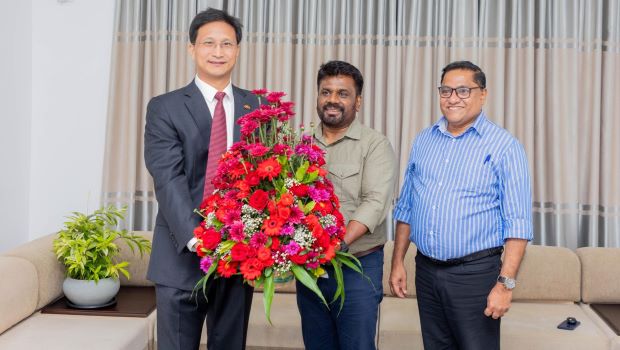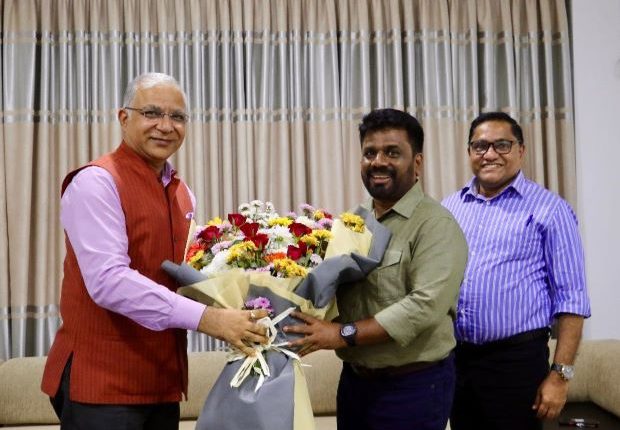Envoys from China, India rush to meet Sri Lanka’s new president
By Shihar Aneez
COLOMBO – Envoys from India and China were the first to meet Sri Lanka’s newly-elected leader even before he took office on Monday (23) as the ninth president of the country.
Both India and China are in a geopolitical cold war in Sri Lanka with Beijing having invested and lent billions of dollars to the island nation, while India has been trying to win the hearts of average Sri Lankans after bitter relations due to its role in the 26-year civil war.
Indian High Commissioner for Sri Lanka Santosh Jha called on President-elect Anura Kumar Dissanayaka at his party office on Sunday (22) and tweeted that he conveyed greetings from India’s leadership and congratulated him on winning the people’s mandate.
“India as Sri Lanka’s civilizational twin is committed to further deepen ties for the prosperity of the people of our two countries,” he tweeted.
Indian Prime Minister Narendra Modi in a tweet said Sri Lanka holds a special place in India’s Neighbourhood First Policy.
“I look forward to working closely with you to further strengthen our multifaceted cooperation for the benefit of our people and the entire region,” he said.
Qi Zhenhong, the Chinese ambassador for Colombo also met Dissanayaka on Sunday, soon after his victory was confirmed.
Xi Jinping in a statement emphasized Sri Lanka’s importance in the Belt and Road Initiative (BRI).
“I attach great importance to the development of China-Sri Lanka relations, and stand ready to work with you to jointly carry forward our traditional friendship, consolidate political mutual trust, achieve more fruitful outcomes on high-quality Belt and Road cooperation, to advance the sustained and steady growth of China-Sri Lanka strategic cooperative partnership based on sincere mutual assistance and everlasting friendship and bring more benefits to the two peoples (countries),” Jinping said.

Sri Lanka’s strategic location in the Indian Ocean makes it a focal point in regional geopolitics, with competing influences from major powers like India and China. Balancing these major powers has a significant impact on political stability.
India under Modi has raised concerns over actions of past Sri Lankan governments, which Delhi says threaten the Indian Ocean region’s security.
Former Mahinda Rajapaksa, who maintained a pro-Chinese approach in his foreign policy, was democratically defeated in the 2015 elections. Rajapaksa however blamed the Indian intelligence arm Research and Analysis Wing (RAW) for his defeat.
Maithripala Sirisena who won the election in 2015 suspended all the Chinese projects soon after he took over the presidency, but two years later was forced to allow the resumptions.
Dissanayaka’s Marxist Janatha Vimukti Peramuna (JVP) was involved in its second insurrection in 1988/89 against an Indian deal and has maintained an anti-Indian sentiment.
Under Dissanayaka’s predecessor, Ranil Wickremesinghe, China maintained a lower profile though it won crucial deals like the Sinopec fuel distributor stations and the rights to build a $4.5 billion refinery in the deep Southern port district of Hambantota with their own funds.
India, on the other hand, has been very active in the country’s domestic politics and economic recovery. India helped with loans amid a delay from the IMF to finalize the bailout package deal while other countries halted loans after default.
India has been interested in several of Sri Lanka’s strategic sectors including defence, energy, and economy.
Under Wickremesinghe’s administration, India pushed hard for some projects including Adani’s renewable energy projects, a unique identity card deal funded by India, and key connectivity projects like electricity grids, along with gas and oil pipelines between the two neighbours.
Most of these projects met strong protests by Dissanayaka’s JVP-led trade unions.
Sri Lanka cannot antagonize either India or China along with other strategic international partners like the United States, Japan, Russia, the United Kingdom, European Union countries, and Iran amid its slow recovery from the unprecedented economic crisis.
-economynext.com



Comments are closed, but trackbacks and pingbacks are open.